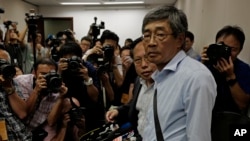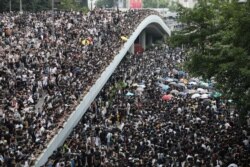A former Hong Kong bookseller is holding up his eight-month extrajudicial detention in China as an example of what could happen to others if a currently suspended extradition bill is passed into law.
Lam Wing-kee, the founder of Causeway Bay Books, was one of five Hong Kong booksellers who disappeared in 2015 only to turn up in Chinese detention. After being held for months in solitary confinement, Lam reappeared in a televised confession, pleading guilty to charges of illegally selling politically sensitive books into China.
Months later, he was permitted to return to Hong Kong temporarily and openly accused Chinese authorities of having put him through eight months of "mental and physical torture." Mainland authorities have accused Lam of jumping bail and still seek his arrest for criminal investigation.
Now living in Taiwan where he is safe from Chinese jurisdiction, Lam told VOA this week that his case demonstrates what could happen to others under the proposed extradition bill.
"What has happened to me — someone who has not committed any crime — can happen to each and every one [in Hong Kong]. This has been crystal clear. So, you see, that's why so many young people have taken part" in recent protests, Lam said during an interview in Taipei's Ximending shopping district, where he hopes to open a bookstore.
Crowds estimated as high as 2 million people took to the streets in Hong Kong on Sunday, marking the largest protest in the city's history. After days of massive and sometimes violent demonstrations, the city's pro-Beijing leader, Carrie Lam, announced she would postpone work on the extradition bill.
Caught in China's dragnet
Lam Wing-kee compared the fight over the proposed extradition law to earlier failed attempts to enact Article 23 of the territory's Basic Law, or constitution, which would outlaw treason, sedition and political ties with foreign organizations.
"If we describe Article 23 as a gun to be put to the heads of Hong Kongers, the extradition law will be another. [If passed,] there will be two guns put to the heads of Hong Kongers. That, to China, will mean tighter controls over Hong Kong," Lam said.
An attempt to pass Article 23 by the city's first post-handover leader, Tung Chee-hwa, ended in spectacular failure in 2003. Half a million residents took to the streets in protest, and officials were forced to shelve it. Tung subsequently resigned in 2005, two years before his term ended.
Lam said Chinese President Xi Jinping can only defuse the current crisis in Hong Kong by fully canceling plans for the extradition law and easing the current chief executive out of office, meeting two of the protesters' five demands.
Carrie Lam has repeatedly offered public apologies over her handling of the bill, but has shown no intention to permanently withdraw the proposed law. She has said it is unlikely to be passed before the current legislative session ends next year.
While facing difficulty in extending his stay and opening a bookstore in Taipei, Lam Wing-kee said he chooses to stay in the self-ruled island because he enjoys Taiwan as a truly free and democratic country.
But he said Taiwan faces an imminent danger from politicians who aspire to closer ties with China. He hopes his example will send a warning to those in Taiwan who, like Carrie Lam, share a sense of identity with mainland Chinese.













